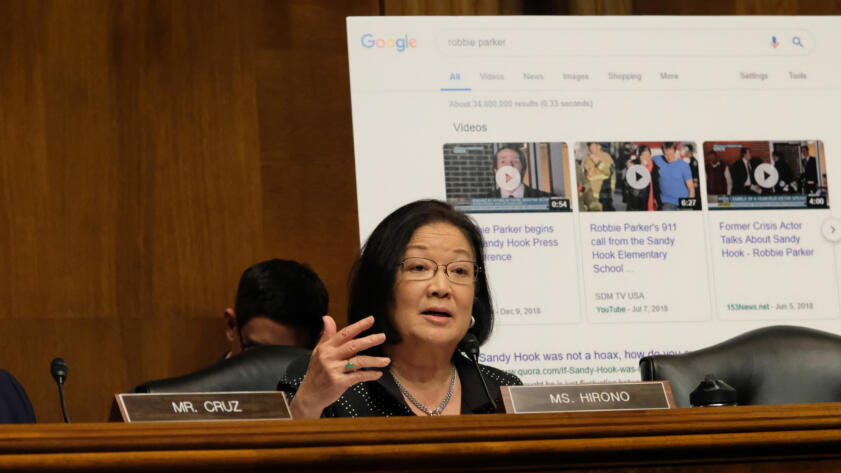A senator who demanded Facebook explain why it allowed advertisers to target credit card ads by age—a violation of written company policy and potentially civil rights laws—is now criticizing the company for failing to provide clear answers.
“Having now been given a second chance to clarify its policies, Facebook has provided an evasive and inadequate response,” U.S. senator Mazie Hirono, a Democrat from Hawaii, said in a statement.

Citizen Browser
Credit Card Ads Were Targeted by Age, Violating Facebook’s Anti-Discrimination Policy
Such ads, along with other age-targeted financial product ads, may violate civil rights laws, attorneys say
The exchange follows a back-and-forth between the senator and company executives that began when Facebook’s vice president of content policy, Monika Bickert, testified that Facebook doesn’t allow discriminatory targeting for “certain types of advertisements, such as financial services” during a Senate Judiciary subcommittee hearing on April 27. Two days later, The Markup published an investigation showing Facebook was doing just that. We found several ads for credit cards and other financial services targeted by age.
In a letter dated May 13, first reported by The Washington Post, Hirono demanded an explanation for the discrepancy between Bickert’s testimony and The Markup’s findings.
Facebook sent its response in a letter on May 21. In the letter, signed “FACEBOOK INC,” the company stated that Bickert’s statement before Congress was accurate. The letter said advertisers aren’t allowed to target by age, gender, or zip code for housing, employment, and credit ads but didn’t elaborate on Hirono’s concerns about its enforcement of the policy. The company also didn’t explain how it moderates ads for violations, only telling Hirono that it prohibits discrimination.
“Our Advertising Policies prohibit all advertisers from using targeting options to discriminate against, harass, provoke, or disparage users or to engage in predatory advertising practices in any ads,” the letter from Facebook said.
The Markup’s investigation into discriminatory advertising on Facebook was part of our Citizen Browser project, through which a nationwide panel of Facebook users share their news feed data with us. That data includes some information about why advertisements on their feeds were targeted to specific panelists.
Facebook policy specifically restricts ads for job opportunities, housing, and certain financial services from being targeted to users by age, race, gender, zip code, sexual orientation, gender identity, family status, disability, and medical conditions.
The Markup discovered several financial services ads targeted by age, which excluded people older than 40 or younger than 34 for opportunities like secured credit cards and home equity loans.
In the May 13 letter, Hirono also criticized Facebook’s anti-discrimination policies for not going far enough. She said Facebook’s limitations on how advertisers can target financial ads applies only to credit opportunities, and not for financial services like debit cards, investment opportunities, and bank accounts.
Hirono cited two lawsuits against the company based on financial services and insurance ads that were targeted by age or gender. The first, Opiotennione v. Facebook, was dismissed by the U.S. District Court for the Northern District of California without prejudice for lack of standing. The second lawsuit, Liapes v. Facebook, is still pending in California Superior Court, San Mateo County. In both, Facebook argued that the plaintiffs weren’t able to show harm because of its ad targeting tools.
“In response to those lawsuits, Facebook appears to admit it enables advertisers to discriminate on the basis of gender and age for financial services ads other than ads for credit,” Hirono wrote in the letter. “Your testimony made no such distinction.”
Because Facebook’s policy on financial services ads only applies to ads for credit opportunities, Hirono said the platform allows for discrimination based on protected statuses like age and gender for the majority of financial services.
“Our policies require credit card advertisers to identify themselves and use restricted targeting options. We’ve reviewed and removed ads from these businesses that ran in violation of this policy,” Facebook’s policy communications director Andy Stone said in an email to The Markup after the May 13 letter. “Our enforcement is never perfect since machines and human reviewers make mistakes, but we’re always working to improve.”
Facebook has long struggled to enforce its anti-discrimination policies. Last August, The Markup found an example of a job ad targeted by age and ethnic affinity. Facebook removed the ad after The Markup reached out. Researchers have also found a gender disparity in the way Facebook’s algorithm may use proxies for gender to decide which groups to show employment and other ads.





